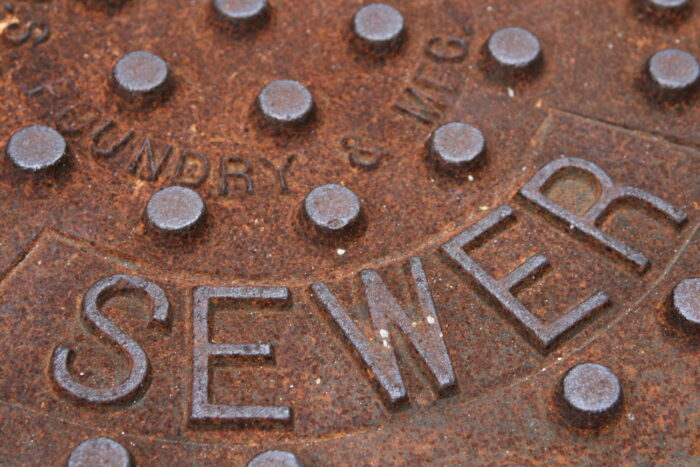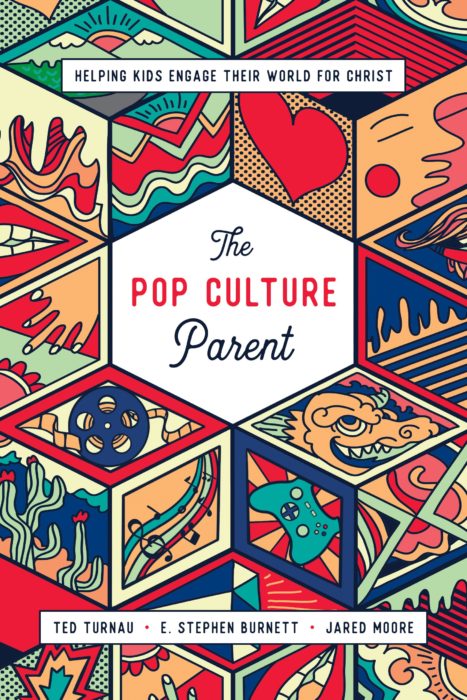Is Pop Culture Like a Sewer for Your Kids?
For years, Christians have often spread several folk sayings about discerning good and evil.1 These sayings include the phrase, “If you play with fire, you will get burned,” or the phrase, “You reap what you sow,” which is based on Galatians 6:7.
But not every “common sense” or “folk wisdom” slogan is actually biblical wisdom.
For example, Christians may have heard the out-of-context quote of two words from Matthew 7:1, “Judge not,” as if that summed up Jesus’s teaching.
Other folk wisdom comes from evangelical or Western religious popular culture, such as “God helps those who help themselves,” or “Cleanliness is next to godliness.” Paul referred to similar slogans as “irreverent, silly myths” (1 Timothy 4:7).
Let’s survey a few of these folk sayings that aren’t biblical, but that might still influence the minds of Christian parents who are challenged to see popular culture in light of the gospel.
 ‘You wouldn’t eat brownies with a little dog poop mixed in!’
‘You wouldn’t eat brownies with a little dog poop mixed in!’
“So what if popular culture contains some good? If someone mixed dog poop into your brownie batter, would you eat them? Even a little corruption makes the whole work worthless.”
This slogan has a ring of truth.
But what counts as the “dog poop”?
Christians might point out elements such as sex and violence. But by that reasoning, we would have to admit that the Bible is itself a poop-contaminated brownie, for it also includes elements of sex and violence.
Context, however, influences any “element” of a cultural work, just like context influences our reading of the Bible. Christians know the Bible is not just a bucket full of disconnected pieces. We know God’s word puts the sex, violence, and profanity it contains into a specific context. It never glamorizes or excuses the abuse of sex, violence, or language. And that makes all the difference in how we understand why God included those episodes.
Likewise, human culture is also more than a bucket full of disconnected “pieces” such as bad words, violence, or sex. Our stories and songs are much more like human beings, complex networks of ideas and images, mixtures of good and bad.
After all, each piece of popular culture came from a person or group of people, and their imaginations are messy mixtures of truth and error, good and bad.
Every one of our entertainments, whether made by a non-Christian or a Christian, is like this. In fact, every human being is like this.
Would we compare every individual person to a poop-infested brownie?
Would we outright reject each one of them because of their flaws?
Jesus did not reject people this way, and we do not reject our children because of sin. Why not? Because we respect them as image-bearers, those entrusted by God to us. Can we not also show respect to popular culture that is made by God’s image-bearers, even while we take caution to avoid elements that pose exceptional risks to our children’s hearts?
 ‘You don’t need to swim in the sewer to know what’s in it.’
‘You don’t need to swim in the sewer to know what’s in it.’
Past generations certainly seem to have enjoyed drawing their popular-culture metaphors out of the toilet.
But this saying is just as flawed as the brownies-with-poop folk wisdom.
It implies people can become “clean” if only we avoid nasty culture, ignoring the truth that our hearts are more like the polluted sewers, and we cannot avoid it.
It also slanders popular culture as if it’s only a filthy sewer. This, of course, ignores the truth that popular culture contains God-given fragments of grace and truth. And it ignores the call that Jesus gives Christians to go even into the actual sewer-like places of the world.
The Christian life is not about avoiding dirtiness to keep ourselves clean. It’s about receiving God’s love and sharing that love with those around us. That means we must be willing to deal dirty people, as well as our own inner-dirt. And it means wisely engaging the culture around us to love the people who are formed by it, even if that culture is dirtier than we’d like.
 ‘Government agents learn to recognize counterfeit bills not by studying counterfeits, but by studying the real thing.’
‘Government agents learn to recognize counterfeit bills not by studying counterfeits, but by studying the real thing.’
In this metaphor, non-Christian popular culture is counterfeit culture, and Christian culture counts as the “real thing.” And if non-Christian popular culture is a counterfeit, we have no need of it. We should stick only with Christian cultures that, we assume, only celebrate truth.
But in fact sin lurks in every cultural work, no matter who creates the work.
And the grace of God shines to some extent in every cultural work, whether made by Christians or non-Christians.
The folk saying also bypasses the fact that our true standard, the Bible, itself challenges us to compare its truth with the world’s counterfeits. For example, see Psalm 34:8, “taste and see that the Lord is good,” and Isaiah 44, which compares God with people’s idolatrous worship of wooden blocks.
Treasury agents are certainly trained to recognize counterfeits. It is true that they start by familiarizing themselves with real money’s appearance and texture. But they don’t stop there. They also compare and contrast real money with known counterfeits in circulation so that they can easily distinguish between the real and the counterfeit in a fast-moving vocation.
Disregard ‘folk wisdom’; acquire biblical wisdom
We could consider several more Christian folk wisdom sayings about popular culture. But these three are sufficient to make the point: What passes as biblical wisdom is sometimes neither biblical, nor particularly wise. These pithy phrases too often oversimplify issues that deserve nuanced consideration. Too often they reject real cultural discernment for an easy, less demanding counterfeit of discernment.
There are no shortcuts for exercising biblical discernment. When you hear examples of Christian “folk wisdom,” whether about popular culture or any other topic, be sure to always compare the slogans with what Scripture really says!
Parents often feel at a loss with popular culture and how it fits in with their families. They want to love their children well, but it can be overwhelming to navigate the murky waters of television, movies, games, and more that their kids are exposed to every day.
Popular culture doesn’t have to be a burden. The Pop Culture Parent equips mothers, fathers, and guardians to build relationships with their children by entering into their popular culture–informed worlds, understanding them biblically, and passing on wisdom.
This resource by authors Jared Moore, E. Stephen Burnett, and Ted Turnau provides Scripture-based, practical help for parents to enjoy the messy gift of popular culture with their kids.
Order The Pop Culture Parent from:
- This article is adapted from material in older drafts of The Pop Culture Parent: Helping Kids Engage Their World for Christ. I’m coauthor of this new nonfiction book, with Ted Turnau and Jared Moore. It’s available from our publisher, New Growth Press, or you can order from Amazon. ↩






























Or maybe purity is not actually a virtue.
Lol. Of course Notleia is anti-purity…
But to take the issue seriously, it really depends on what you mean by “purity.” People normally see purity in, say, water as a virtue. Which simply means the water is water and not mixed with chemicals other than water. Pure water is good. Though a bit of certain chemicals can arguably make it a bit better–say by adding flouride.
However, pure water is basically harmless. Yes, it is possible to drink too much, but a human being won’t naturally do that as far as I know. Though there have been cases of other humans like coaches or military supervisors commanding someone to drink to the point where they died, a person normally knows when he or she has had plenty of water and stops drinking. So…water is essentially non-toxic.
But the moment a person decided to improve water by adding chemicals like flouride, the risk of putting in too much raises its head. Which means there’s a risk of someone being harmed without realizing the harm–not until it’s too late. So there should be caution involved in steering away from purity.
Of course there are some things you would never want to deliberately add to water, because in any known quantity do they do nothing but harm, so adding them at all–even if a person could survive the dosage–is bad. (E.g. plutonium–the amount of that allowable in water is zero.)
Is my analogy flawed? Sure. But in short I’m defending non-Aristotellian thinking. Aristotle believed everything was good in moderation. I’m saying some things are good as much as you can get them–while other things are goood in moderation–and still other things are to be avoided at all costs.
By the way, the poop-in-the-food analogy is meant to convey the same meaning as my plutonium-in-your-drinking-water example. It just means there are certain things nobody ever needs to have any of. Is that true? Clearly yes, at least in things we eat and drink.
Is it also true in popular culture? I would say so–I would say we need zero graphic depictions of sex intended to arouse the reader or viewer (a.k.a. porn). I think E. Stephen actually agrees about that.
While most things can be intelligently engaged in moderate amounts, certain other things ought to be avoided altogether. Maybe not very many things make the list of “always avoid” but there are some such things…
By definition, purity is the absence of any vice and the presence of all virtues.
People need to realize that just because something is bad/useless/whatever in one capacity, doesn’t mean that it is automatically bad in another. Sure, you wouldn’t eat poop, but you MIGHT fertilize your garden with it. It’s the same with stories. You might not look at a char’s bad behavior as something to emulate, but it can be ‘fertilizer’ for good conversations, examples of what NOT to do, etc. And examples of what not to do are just as valuable as examples to emulate.
People are obsessed with avoiding things rather than understanding and reacting to them correctly. Christians do/have done that a lot on the past, and a lot of cancel culture liberals are getting worse and worse about it now. It’s a nasty part of human nature we need to learn to handle better.